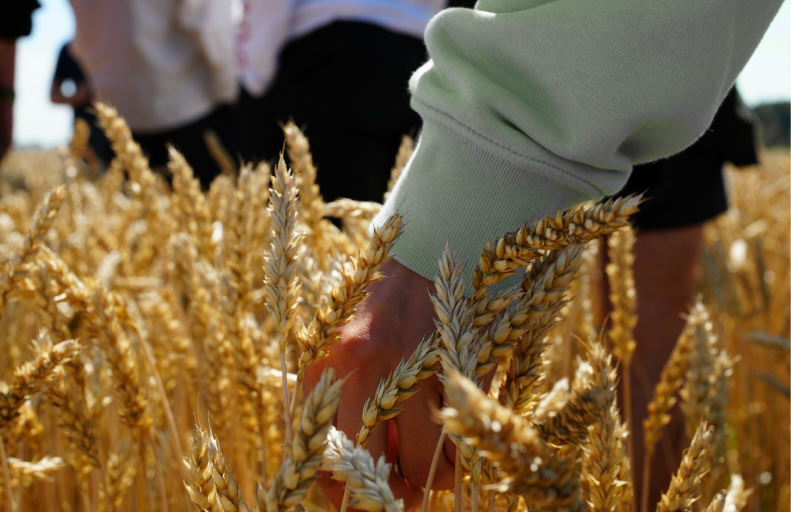
Sustainable Quake Podcast

Having dedicated 15 years to impact-driven product development, I have reached a crucial realisation. While innovative solutions aimed at reducing greenhouse gases are commendable, they alone are insufficient to achieve the ambitious target of limiting global warming to 1.5 or even 2.0 degrees Celsius, as outlined in the Paris Climate Agreement. It is imperative that we complement these efforts with additional measures, particularly those focused on achieving negative emissions.
In 2019, I preformed a systematic analysis of where the greatest potential for negative emissions lies. This exploration ultimately led me towards the topic of regenerative agriculture. What fascinates me and the whole Klim team about this form of agriculture are its extensive benefits: Which go way beyond emissions reduction; more on this later. I began by identifying the obstacles that farmers encounter when transitioning, aiming to develop a business model that facilitates the rapid and scalable adoption of regenerative agriculture, tailored to the unique needs of farmers. After all, that’s our mission: To drive the regenerative transformation of the agricultural sector by empowering farmers to transition to regenerative agriculture — quickly and at scale — enabling them to farm sustainably and profitably, and to be publicly recognised stewards of the Earth.

Our holistic offer to multiple stakeholders, ranging from farmers to companies to consumers, is designed to significantly reduce the environmental impact of agriculture. Currently, food production alone accounts for a staggering 1/4 of global emissions, surpassing the combined emissions of air traffic, car traffic, and building use. Through the widespread adoption of regenerative agriculture practices, we have the potential to annually sequester up to 11 gigatons of carbon globally. This solution not only holds immense promise for addressing climate change but also positively impacts seven Sustainable Development Goals (SDGs), including biodiversity conservation, food security, and enhanced water cycles.
To successfully implement regenerative agriculture at scale, our approach revolves around a user-friendly and unbureaucratic platform for farmers. This digital companion is scalable worldwide and serves as the catalyst for transforming the entire agricultural sector, resulting in enhanced soil fertility, decreased reliance on fertilisers and pesticides, and sustained crop yields. Consequently, farmers, along with food companies, can effectively reduce greenhouse gas emissions from their operations while concurrently sequestering additional atmospheric CO₂ through humus build-up. Moreover, as I’ve already touched on, this transition unlocks numerous co-benefits, including protection of ecosystems, fair and secure food supply, and ultimately farm-profitability.
Furthermore, even industries without direct ties to the agricultural supply chain can contribute to the decarbonisation of the food sector. They can do so by engaging in the purchase of Klim Carbon Credits, which actively promotes farmers’ transition to regenerative practices.
In our pursuit of a more sustainable world, we face a multitude of challenges that demand our attention and collective action. Among these challenges, several key factors deserve special consideration. Firstly, the need to feed a rapidly growing global population adds immense pressure to agricultural systems. This, coupled with the impact of climate change on crop yields and water availability, necessitates innovative approaches to ensure food security and resilience in the face of changing environmental conditions.
Furthermore, the imperative for more sustainable and environmentally friendly farming practices is evident. The methods employed in industrial agriculture have often contributed to ecological degradation and resource depletion. To address this, there is a pressing need to adopt regenerative practices that restore soil health, minimise chemical inputs, and enhance biodiversity in agricultural landscapes. The loss of biodiversity in these landscapes is a significant concern that must be addressed to preserve ecosystem services.
One of the primary challenges we face is soil degradation, which directly impacts the productivity of farmland and exacerbates climate change. Soil degradation leads to the release of CO₂ into the atmosphere and hampers the capacity of agricultural systems to sequester carbon effectively. It is imperative to prioritise sustainable soil management practices that promote soil health, and we need to act quickly: According to the Food and Agriculture Organization (FAO), we lose about 24 billion metric tons of fertile soil worldwide each year due to erosion.
Addressing these challenges requires a holistic approach that integrates sustainable farming practices, innovative technologies, and supportive policies. By fostering resilient and regenerative agricultural systems, we can not only ensure food security and environmental sustainability, but also mitigate the adverse effects of climate change and preserve the integrity of our natural ecosystems for generations to come.
...
The German AgriTech company Klim is creating a joint movement with farmers, businesses and consumers to scale regenerative agriculture as quickly as possible, sustainably reduce CO₂ emissions and improve soil health as well as biodiversity. Thus, it makes an important contribution to climate protection and food security. The digital platform offers farms documentation and funding opportunities as well as access to knowledge and a community. Companies that partner with Klim have the opportunity to support regenerative agriculture within or outside their own supply chains, and consumers can make their contribution by purchasing products with the Klim label. Klim GmbH was founded in 2020 in Berlin by Dr. Robert Gerlach, Nina Mannheimer and Adiv Maimon with the vision for regenerative agriculture.